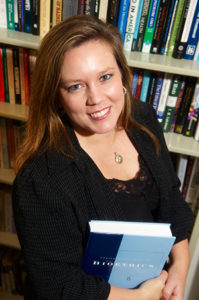Mar 29

New Master’s Program Considers Ethical Issues & Humanities in Health Care
Technology has brought remarkable advances in medicine and science, but it also has created many difficult ethical issues. Examining these issues, individually and institutionally, is becoming increasingly important in health care today.
Julie Aultman, Ph.D., a professor in the Department of Family and Community Medicine, has spent much of her career researching and teaching about these sometimes-tricky topics. Her dedication has resulted in the creation of a new Master of Arts in Medical Ethics and Humanities program beginning at the University this fall.
NEOMED already has a longitudinal Human Values in Medicine course that spans all four years of the medical education curriculum, Dr. Aultman explains. “We dedicate about 150 contact hours to make sure we provide an outlet for professional and moral development of our students,” she says.
Since 2005, the University has offered a bioethics certificate program led by Dr. Aultman, who found that many students who completed it wanted to develop their skills even further. The result has been the creation of the new master’s degree program. More than five years in the making, the Master of Arts in Medical Ethics and Humanities degree is designed to be completed either in conjunction with a medicine, pharmacy or nursing degree, or by mid- career professionals who want to expand their expertise in this arena.
Structure of the Program
All students will start with a six-credit Foundations in the Medical Humanities course along with a practicum.
“We will look at various themes in medicine, such as race, ethnicity and gender bias, and concepts of disease and illness, disability, death and dying. There is both ethical and medical humanities content,” says Dr. Aultman, adding, “We want to see how professionals in our community work with these particular concepts in context.”
Students also will participate in a robust set of courses about research practices.
After this phase, students will choose to enter one of two tracks, which is what Dr. Aultman calls the most unique aspect of the program. They can either follow a medical humanities path or choose to study ethics as applied to clinical settings.
All of the program’s core classes and master’s thesis work will be conducted at NEOMED, but since the program is part of a partnership with Kent State University and The University of Akron, students can complete elective course work on those campuses as well.
Dr. Aultman’s Background
 Dr. Aultman says she didn’t intend to become a specialist in ethics when she was a pre-medicine student with a minor in science, technology and society at Franklin & Marshall College in Lancaster, Pennsylvania. She had her eye on medical school, but after college she started doing graduate work in Yale University’s neuroscience laboratory that piqued her interest.
Dr. Aultman says she didn’t intend to become a specialist in ethics when she was a pre-medicine student with a minor in science, technology and society at Franklin & Marshall College in Lancaster, Pennsylvania. She had her eye on medical school, but after college she started doing graduate work in Yale University’s neuroscience laboratory that piqued her interest.
She went on to receive a master’s degree from Case Western Reserve University’s Bioethics Program, then a doctorate that combined medical ethics with her love of cognitive science at Michigan State University.
“I was able to teach and serve in various capacities as a clinical ethicist, working in hospitals as a patient advocate. From there, I started working at NEOMED nearly 14 years ago,” she says. “In addition to my teaching duties, I am pleased to serve multiple hospitals in our area, participating in clinical ethics consultations and policy development. I also teach health law at The University of Akron.”
Her areas of research are mental health issues and public health challenges.
“I love the intersections of science, technology, medicine, the social sciences and ethics,’’ says Dr. Aultman. “It all comes together at some point. The end result is the patient and how we improve health care access, availability and overall standards.”
Apply to the Master of Arts in Medical Ethics and Humanities program. Applications are open now through May 1.

